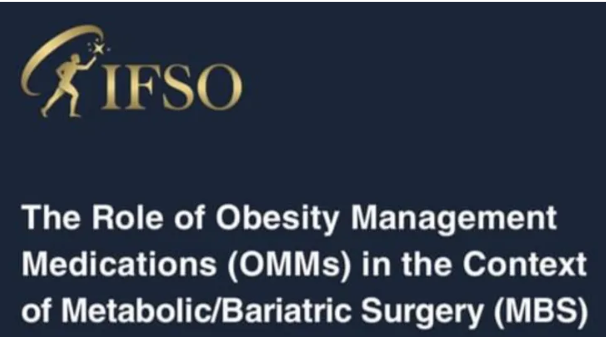* Article taken from Bariatric News, Dec 3, 2024, written by Owen Haskins
The International Federation for the Surgery of Obesity and Metabolic Disorders (IFSO) has published an international consensus position statement on the role of obesity management medications (OMMs) in the context of metabolic bariatric surgery (MBS), which the authors hope the consensus will guide clinical practice and assist in creating an algorithm to aid clinicians in their decisions when treating patients with a suboptimal initial clinical response or recurrent weight gain after MBS.

The paper, ‘International consensus position statement on the role of obesity management medications in the context of metabolic bariatric surgery: expert guideline by the International Federation for the Surgery of Obesity and Metabolic Disorders (IFSO)’, published in the British Journal of Surgery, was written on behalf of the experts of the International Consensus on the Role of Obesity Management Medications in the Context of Metabolic Bariatric Surgery.
IFSO gathered together a multidisciplinary group of international experts in obesity management to develop evidence-based recommendations to serve as a global reference for using OMMs before and after MBS. Experts included members of IFSO, the World Obesity Federation (WOF), the European Association for the Study of Obesity (EASO) and the International Diabetes Federation (IDF) and were entirely chosen from academia, without representatives from industry. These recommendations were developed through a Delphi process, identifying areas of expert consensus after a systematic review of the published literature and highlighting areas warranting further research.
The topics for discussion and voting were separated into three modules: module 1, common understanding of obesity as a disease, the benefits of the extent of weight loss on obesity-related health risks, and the use of OMMs before MBS; module 2, use of OMMs after MBS; and module 3, future perspectives.
The expert group reached grade A or A+ consensus for the following main statements:
- OMMs after MBS result in weight loss that is similar to that achieved for non-surgical patients and OMMs should be considered for treating a suboptimal initial clinical response or recurrent weight gain after MBS
- For patients requiring OMMs to maintain a healthy weight after MBS, OMMs should be withheld until the achievement of a weight plateau
- OMMs should be considered before revisional surgery
- The main areas identified for further research included postoperative intermittent use of OMMs and the long-term safety, efficacy and cost-effectiveness of combined strategies
The authors stated that it is important to highlight that most studies have not used modern OMMs but rather other medications (for example orlistat, phentermine/topiramate, or liraglutide). Nevertheless, they noted that there is insufficient evidence to recommend OMMs routinely before MBS, although there is very low evidence that OMMs – mainly the modern ones – should be stopped before MBS to decrease potential anaesthetic complications.
In addition, the experts agreed:
- OMMs should be generally withheld until the achievement of a weight plateau, allowing the assessment of the effect of MBS alone, before starting OMMs
- There may be some patients who may benefit from early concomitant OMMs and MBS, therefore the experts agreed that research is needed to identify predictors of which patients will likely substantially benefit from combined pharmaco-surgical therapy for obesity and its complications.
- There is a need for additional studies on the eventual additive effects of OMMsand MBS on cardiovascular, renal, T2DM and weight loss outcomes
- There was broad agreement regarding the effectiveness of adjunctive pharmacotherapy in patients with a suboptimal initial clinical response orrecurrent weight gain after MBS
- There consensus for using modern OMMs and endoscopic therapies before offering revisional/conversion surgery, which may be a safer and more effective strategy.
- Consensus among the experts was low on the potential added benefits of endoscopic procedures regarding the outcomes of OMMs
“Future studies need to include weight loss and the remission or improvement of obesity complications as a composite primary outcome, as no robust evidence exists regarding the eventual mechanistic synergy or added benefits for modern pharmacotherapy and MBS,” the authors noted. “…Finally, consensus was reached regarding the need for
studies to determine the mechanisms of action of combined medical and surgical treatments and a better understanding of payors about obesity treatments in equipoise with other chronic diseases.”
The findings were featured in the paper, ‘International consensus position statement on the role of obesity management medications in the context of metabolic bariatric surgery: expert guideline by the International Federation for the Surgery of Obesity and Metabolic Disorders (IFSO)’ published in the British Journal of Surgery.
To access this paper, please click here